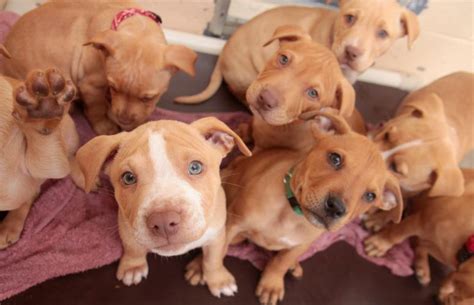
Did you know that approximately 3.3 million dogs enter animal shelters in the United States each year, and a significant portion of them are pitbull dogs? These noble and loyal creatures often fall victim to misconceptions and misinformation, leading to an increased number of pitbull dogs for adoption. In this article, we will delve into the world of pitbull dogs, debunk common myths, and guide you through the process of adopting a loving, four-legged companion.
1. Pitbull Dogs for Adoption: An Overview
Also known as the American Pit Bull Terrier, pitbull dogs are a breed known for their strength, confidence, and strong-willed nature. However, many misconceptions surround these dogs, often leading to unfair stigmatization. Pitbulls are commonly misunderstood as overly aggressive or dangerous when, in reality, they are extremely loyal, affectionate, and intelligent. Unfortunately, these misconceptions contribute to the high number of pitbull dogs in shelters and the need for pitbull dogs for adoption.
Several factors contribute to pitbull dogs ending up in adoption shelters. Some are abandoned by their owners for various reasons, while others are rescued from abusive or neglectful situations. The overbreeding of pitbulls also contributes to this issue. Regardless of their past, these dogs deserve loving and responsible homes where they can thrive and overcome any obstacles they have faced.
2. Pitbull Dogs for Adoption: Finding the Right Match
Before adopting a pitbull dog, it’s crucial to research the breed thoroughly to determine if they are the right fit for your household and lifestyle. Understanding their common behavioral traits and temperament is essential in making an informed decision. Pitbulls are known for their intelligence, energy, and playful nature, making them great companions for active families. However, they also have a strong drive and may require an experienced owner to provide consistent guidance and training.
To identify the right pitbull dog for your home, consider factors such as activity level, socialization needs, and compatibility with other pets or children. Look for a dog that matches your lifestyle and can adapt well to your household dynamics. Asking the adoption shelter staff about individual dogs’ personalities and engaging in a meet-and-greet can help ensure a proper match.
3. Adopt Pitbull Puppy: Preparing for Your Life Together
When you adopt a pitbull puppy, early socialization and training are critical to ensure that your new companion grows into a well-adjusted adult dog. Enrolling in obedience training and exposing them to various people, environments, and other animals can help develop their confidence and social skills. Additionally, providing them with chew toys and puzzles can keep them mentally stimulated and satisfied.
Before bringing your pitbull puppy home, gather essential supplies such as food, bedding, grooming tools, a collar and leash, toys, and crates or baby gates for house training and management. To create a safe and comfortable environment, secure potential hazards and make any necessary modifications to your living space. Staying consistent in training and establishing a routine will help your pitbull puppy adapt quickly to their new home.
4. Pitbull Puppy Adoption: Understanding the Process and Requirements
The pitbull puppy adoption process typically involves submitting an application, undergoing a screening process, and obtaining approval from the adoption organization. This may include interviews, home visits, reference checks, and vet consultations. The process is designed to ensure that you are fully prepared to provide a loving and stable environment for your new pitbull puppy.
Adopting a pitbull puppy comes with financial, time, and energy commitments. It’s important to consider routine and unexpected expenses such as vet care, grooming, training, and nutrition. Additionally, be aware of any regulations or restrictions related to pitbull dog ownership in your region. These may include breed-specific legislation, insurance requirements, or housing guidelines.
5. Pitbull Puppies to Adopt: Finding Reputable Adoption and Rescue Organizations
When searching for pitbull puppies to adopt, ensure that you are working with reputable adoption and rescue organizations. Seek recommendations from friends, veterinarians, or online resources such as social media groups or websites dedicated to pitbull dog rescue and adoption. It’s essential to verify the organization’s credibility by researching their history, policies, and success stories.
Be cautious of potential red flags, such as a lack of transparency, questionable practices, or high adoption fees. Reputable organizations will prioritize the well-being of the dogs in their care and match them with the most suitable adopters. Supporting local pitbull adoption efforts and organizations is an excellent way to make a meaningful impact on the lives of dogs in need, giving them the chance to find loving, forever homes.

In summary, with the increasing number of pitbull dogs in shelters, it’s essential to debunk common misconceptions about their temperament and create awareness about the necessity of providing them with loving homes. The most important points from this article include:
- Pitbulls are often misunderstood as overly aggressive, when in reality they are loyal, affectionate, and intelligent creatures.
- Researching the breed, understanding its behavioral traits, and finding a dog that matches your lifestyle is key to a successful adoption.
- Early socialization and consistent training are crucial in raising a well-adjusted pitbull puppy.
- Being aware of the adoption process and regional regulations can help you prepare for a successful pitbull adoption experience.
- Finding and working with reputable adoption and rescue organizations is essential in ensuring the well-being of pitbull puppies and their potential adopters.
By considering these key factors and remaining committed to responsible pitbull ownership, you can make a significant impact on the lives of these deserving dogs and create a lasting bond with your new four-legged friend.
